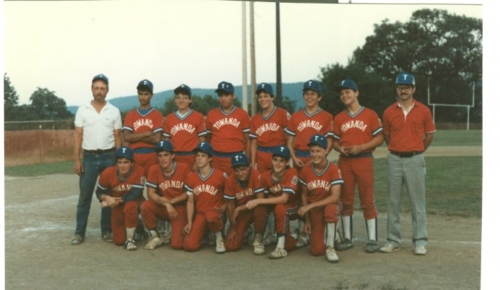For it's one, two, three strikes - you're out...
Prevously published on CUinsight.com.
Written by Anthony Demangone
I have a love affair with baseball. IâÂÂve written about it before, and IâÂÂll do so again.
With apologies to no one.
The crack of a bat during batting practicing, echoing within an empty stadium. The loud pop of the catcherâÂÂs mitt. The bark of the umpire. The percussion of footsteps as a player sprints toward first.  Each sound of the baseball symphony brings memories flooding back to me.
Now, baseball may not be your thing. I understand that. I can even respect it. But it is mine, and it belonged to my Grandfather. And my nephews.
As is true with most things, baseball has a few lessons buried beneath its surface. Â Here are just a few.
1. Baseball is a series of cycles. A baseball season itself is a cycle, starting in the Spring and ending in the Fall. But within the season itself, there are many more. You cycle through your starting rotation. Batters cycle through the line-up. The schedule cycles through your division. And so it is with business. It is rare to do things just once. Rather, we move through annual, weekly, and monthly events. And the beginning of each new cycle gives us a wonderful opportunity to reassess things.
2. Failure plays a large part. Even the best hitters fail 650 time out of 1,000. The best teams only win 60 percent of the time. It is not uncommon for the last-place team to take a series or two from some of the best. Baseball players are not afraid to fail. ThereâÂÂs always next inning, or tomorrow, or next year. ThereâÂÂs a power in that outlook which cannot be underestimated.
3. It is the perfect blend of teamwork and individual responsibility. Anyone who has seen a double-play turned well, or who saw a relay throw cut someone down at home, knows that baseball is largely a team sport. And yet while each player relies on teammates, there is a great deal of personal responsibility. Each pitcher has an âÂÂearned run average,â which tries to measure how well they pitch. Batters have personal batting averages. Defenders have fielding percentages. Baseball finds a way to push both teamwork, and individual excellence.
4. Baseball has a long-term outlook. Players have ups and downs. It isnâÂÂt uncommon for hitting or pitching slumps to last two weeks or more. Because the baseball season is so long, managers have a great deal of patience with players. Usually, good players snap out of slumps. People revert to their career form. And for that reason, baseball fans have patience. Your team is doing well (or poorly) in April? Call me at the All-Star break, and weâÂÂll talk then.
I know that many are not baseball fans. But I hope you can see the lessons here, and perhaps a greater lesson overall. Baseball is an American institution. As are many other things.
If one looks at any successful thing, baseball, a fast food restaurant, or a credit union, patterns should emerge. And those patterns can sometimes be applied to other things.
So, if baseball isnâÂÂt your thing, I give you this challenge. Name your thing, and try to see what makes it special.
Chances are thereâÂÂll be lessons aâÂÂplenty.
***
On Thursday this week, NAFCU will host a webcast on the Target Data Breach. This will be quite good, as we have credit union legal expert and attorney, Bruce Jolly, on hand to lead the discussion. We also have NAFCU General Counsel, Carrie Hunt. There is so much confusion on what credit union can/should do following the breach. This webcast will help drill down into the details regarding who is on the hook for costs, and what/how/if credit unions can expect reimbursements. If you have people asking you questions about the breach and what your credit union can do, this webcast will supply you with the answers.Â


